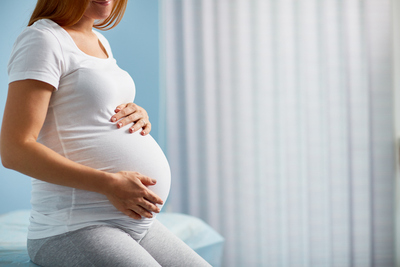The Pregnant Woman’s Guide to Eczema, Psoriasis, and HPV

Swelling. Nausea. Extreme fatigue. Being pregnant can be quite a challenge. Itchy, dry, and cracked skin while pregnant only add to the changes happening to your body–and none of them make life better.
ut there’s no doubt: pregnancy skin conditions like eczema, psoriasis, and HPV can really up the ante while you’re expecting. In addition to being uncomfortable, you’ve got to think carefully about any skin treatments you pursue–and whether they’re safe. Plus, they might cause you to worry about what you’ll pass along to your baby.
It can all be confusing–and it doesn’t help that some of these pregnancy skin issues might be brand new to you. That’s why we’ve put together a guide to the three most common skin conditions experienced by pregnant women. Find out how pregnancy can either bring on or alter these conditions, what treatments are safe to use, and whether or not your baby is at risk.
Eczema and Pregnancy
Eczema accounts for about half of all skin conditions among pregnant women. And in some cases, pregnancy seems to cause it: around 70% of pregnant women with eczema have never had it before. In women who already have eczema, pregnancy may exacerbate it.
While eczema won’t make a negative impact on your baby, it’s definitely no picnic.
To complicate matters, many of the usual treatments for eczema may not be safe for your baby. Because of this, you may want to ask a doctor before using antihistamines, antibiotics, cortisone and corticosteroids, and calcineurin inhibitors (like Elidel and Protopic).
So are you just stuck with itchy, sandpaper dry skin for the whole of your pregnancy? Definitely not! There are still plenty of treatments that work for pregnant eczema patients. Here are a few suggestions on how to treat eczema while pregnant:
- Avoid allergens and irritants (like wool, synthetic fabrics, and fabric softener)
- Use ointments or creams, topical steroids (in low and moderate doses), and ultraviolet
- Take lukewarm (not hot) baths and avoid using soaps that contain fragrances or preservatives
- Keep the temperature in your house cool
- Wear light, breathable clothes (cotton, silk, and linen are good options)
- Minimize your stress (we know that’s hard during pregnancy!)
A word about that last one. Stress is an eczema trigger for many patients, and being pregnant can definitely bring on a lot of stress. So take some deep breaths, go lie down for a bit, listen to some calming music, and tell yourself everything’s going to be fine. (It is!)
HPV and Pregnancy
If you have HPV (human papillomavirus) during your pregnancy, you may worry about passing the infection to your baby. Rest easy: while it is possible for mothers to pass HPV to their child during birth, this rarely happens. Even if it does, the chances that HPV will negatively affect your child are slim. Most cases of HPV occur without any symptoms and clear up on their own within a few years.
There is a possibility that, if you have HPV with genital warts, your child will develop warts on his or her vocal cords and on other areas of the body. Known as recurrent papillomatosis, this condition is very rare, but serious. So if you have genital warts during pregnancy, you might want to just keep an eye out for this during your child’s infancy and early years.
Since HPV clears up on its own, there’s no treatment for the virus. You can get treatment for genital warts from a dermatologist, though. If you’re pregnant, your dermatologist will probably caution against using topical products that you can apply yourself at home, as these aren’t recommended for use during pregnancy. Any other method your dermatologist recommends for treating warts during pregnancy is probably perfectly safe.
If you find out during your pregnancy that you have precancerous cells from HPV, your doctor will probably wait until after your pregnancy to treat them. Most forms of HPV-related cancer take several years to develop, so you’re safe waiting until after your baby is born.
Psoriasis and Pregnancy
We have good news… and bad news. 60% of women find their psoriasis clears up during the 10 months of their pregnancy, while 20% find that their psoriasis gets worse. Some of you are also in for a psoriasis flare up shortly after giving birth. We’re sorry or glad to report that psoriasis’ response to pregnancy is a little bit hard to predict.
There’s some evidence that severe psoriasis can increase the risk of having a low birthweight baby. In most cases, though, you won’t need to worry about your psoriasis affecting your child.
As far as treatment for psoriasis goes, steer clear of systemic and biologic drugs. And avoid oral retinoids, methotrexate, and cyclosporine – as these are linked to birth defects.
Your best bet is to use topical treatments like emollients and moisturizers. Limit your use of topical steroids, and use them in low to moderate-doses. Ultraviolet B (UVB) is probably safe, but avoid using Ultraviolet A, as it may cause light sensitivity in your baby.
If your psoriasis does flare up during your pregnancy, here are some tips for increasing your comfort without endangering your baby:
- Soak up some sun: if possible, try and get out in the sun for five to ten minutes at a time (you don’t want to get sunburned). If the weather is dark and cloudy, you can always try light therapy with a dermatologist as an alternative.
- Moisturize: use ointments or creams to soothe that dry skin, and apply them liberally. Moisturizer is especially effective right after a bath.
- Stress less: stress can make your psoriasis flare up, so make sure you’re getting enough sleep, practice calming techniques, listen to peaceful music, take some time out to relax – whatever works.
Skin care during pregnancy is always important. If you have any questions about what skin treatments are safe during pregnancy, or if you’re concerned about skin flare-ups, it’s best to get a professional opinion from a dermatologist.
Whatever you do, though, don’t stress about it! While itchy dry skin may be annoying during pregnancy, it’s no cause for alarm. (Plus, stressing isn’t good for your skin!)
